Tamou te apii'anga a te Ai Tupuna
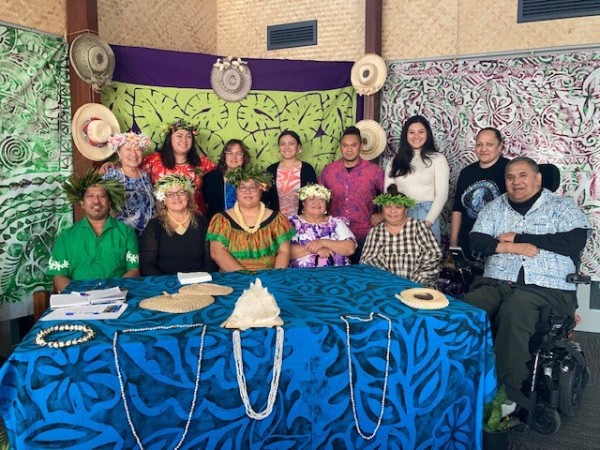
'E Reo Noku – My language' is a community project to capture the unique stories, history, culture, and languages of the 10 inhabited islands within the Cook Islands. Many of these islands have their own unique cultures and traditions that many Cook Islanders living abroad are unaware of.
Embedded content: https://youtu.be/8dq8ij1OXJc"Tuatua Māori ua te Metua ki ta ratou tamariki, i roto i to ratou ngutuare"
Parents need to speak the language in their homes to their children.
- Papa Huda Robati
The project set out to preserve these cultural traditions from these elders before their knowledge is lost. This was done by filming members of the Cook Island community living in Porirua, New Zealand, with the intention of creating video resource for the Te Reo Tupuna language classes. As well as working together to create this content, we will be making the videos available publicly for use all those of the Cook Islands.
The Cook Islands is made up of two island groupings, the Northern group, and the Southern group. Because of the vast distance between these islands, each of the inhabited islands has its distinct language, traditions, legends, and stories which make them unique.
With many of the Cook Islands population migrating away to seek better opportunities, the reality is that many are disconnected from their island traditions and sometimes their own personal cultural identity.
There are quite a few online resources available that people can access to learn and listen to Cook Island Māori.
Centre for Pacific Languages Cook Island Language classes
Streaming community radio like ‘Tuatua Mareva’, hosted by two Papas from Tupapa, Peter Winchester and Tupu Araiti.
Pacific Media Network's Cook Islands page.
But the need for preserving our language and culture has never been as critical as now. In 2010 the United Nations Education, Scientific and Cultural Organisation (UNESCO), published an 'Atlas of the world's languages in danger', and in that report they listed:
The Rarotonga language as ‘Vulnerable’. Most children speak the language, but it may be restricted to certain domains such as the home
The languages in the Northern Cook Islands such as Pukapuka as ‘Definitely Endangered’. Children no longer learn the language as a 'mother tongue' in the home.
The Penrhyn language as a ‘Severely Endangered’ language. It is spoken by grandparents and older generations; while the parent generation may understand it, they do not speak it to children or among themselves.
I regret that we didn’t get this project started earlier. The elders of the first enua (island) we approached were very supportive of our approach and willing to share their knowledge in 2020. But the pandemic impacted us all and life became busy, and the project was put on hold. During this period of time one of the elders passed away before we had started filming.
What happens when our elders pass?
Are we still Cook Island if we can’t speak the reo?
My official role on this project was as a producer, but it was a labour of aroha and meant many conversations with friends, classmates, and most importantly with our Cook Island elders. Being a producer on this project has made me feel many emotions. I've been joyous, filled with pride and mataora (happiness), and yes, some regrets.
We filmed these videos over two Saturdays in 2022. The community members from each enua had the opportunity to share 30mins of what made their island unique. The script and what they chose to present was entirely up to them.
I didn’t expect to see such different arrays of cultures and traditions. What surprised me was that none of the presentations were the same. From the ten groups filmed each island shared unique songs, legends, scriptures, ancestors, fauna and flora, and of course different recipes!
The common theme between the groups were that the language needs to be spoken. The need to want to learn more about your roots, and traditions that have been instilled by our ancestors.
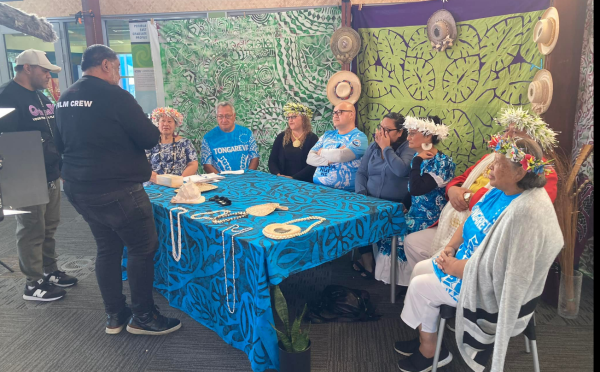
Tongareva Enua getting briefed by Oriana TV before filming
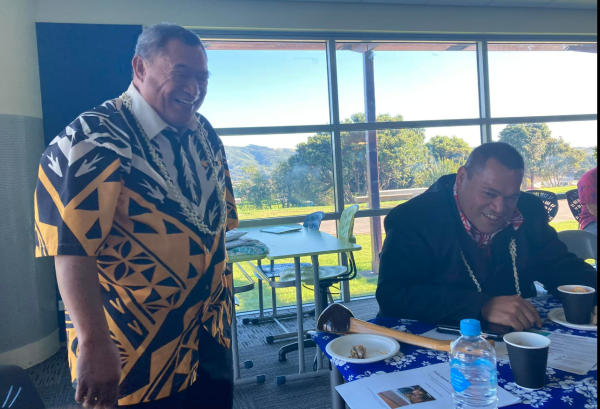
Papa Huda Robati and Papa Orometua Elder sharing more stories with the project team after filming

Nukuroa Enua with the ‘E Reo Noku’ project team.
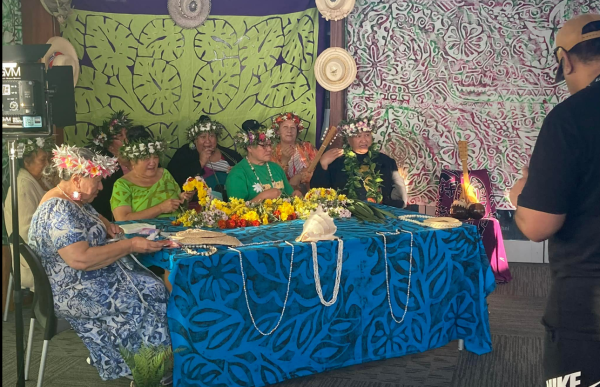
Akatokamanava Mamas demonstrating how to make an ‘Ei katu’ (flower head garland)
As Cook Islanders, we need to do more to ensure that our culture, language, and traditions will still exist for future generations. It is said that it takes three generations to learn the language for it to survive but can be lost within one generation.
This is my challenge to you – embrace your culture and language. Get involved in groups like the mamas tivaevae group, Cook Islands Day, and church activities. Take these opportunities to learn and listen to our parents, grandparents, aunties, and uncles. Their experiences living on the Island and their stories will be the ones we treasure the most when these Islands disappear. We don’t know if these places will still exist in 100 years. These may become distant places we call ‘Hawaiki’.
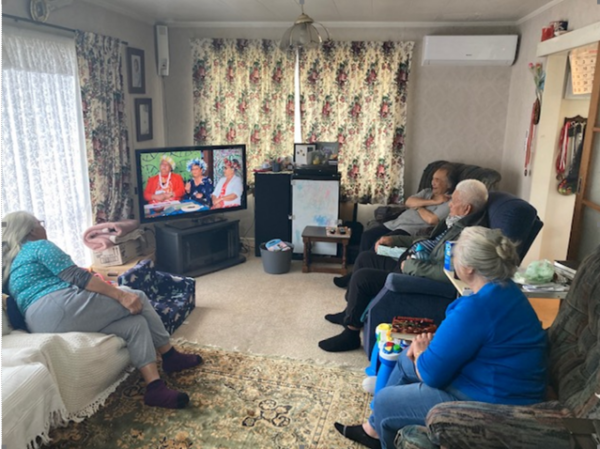
Taputukura's Mum (Caroline Raea) Dad (Mou Raea), Aunty (Tepaeru Mata) and Uncle (Pare Marsters) watching the E Reo Noku videos in the sitting room.
Embedded content: https://youtu.be/h1QwTjmdTmY"E kai tō Ko'u poke e uri i Manavaroa"
Relish the skills and knowledge you achieve, but reflect back and never forget Mangaia.
- Mama Metuakore Kapao-Tuara
The information on this site has been gathered from our content partners.
The names, terms, and labels that we present on the site may contain images or voices of deceased persons and may also reflect the bias, norms, and perspective of the period of time in which they were created. We accept that these may not be appropriate today.
If you have any concerns or questions about an item, please contact us.